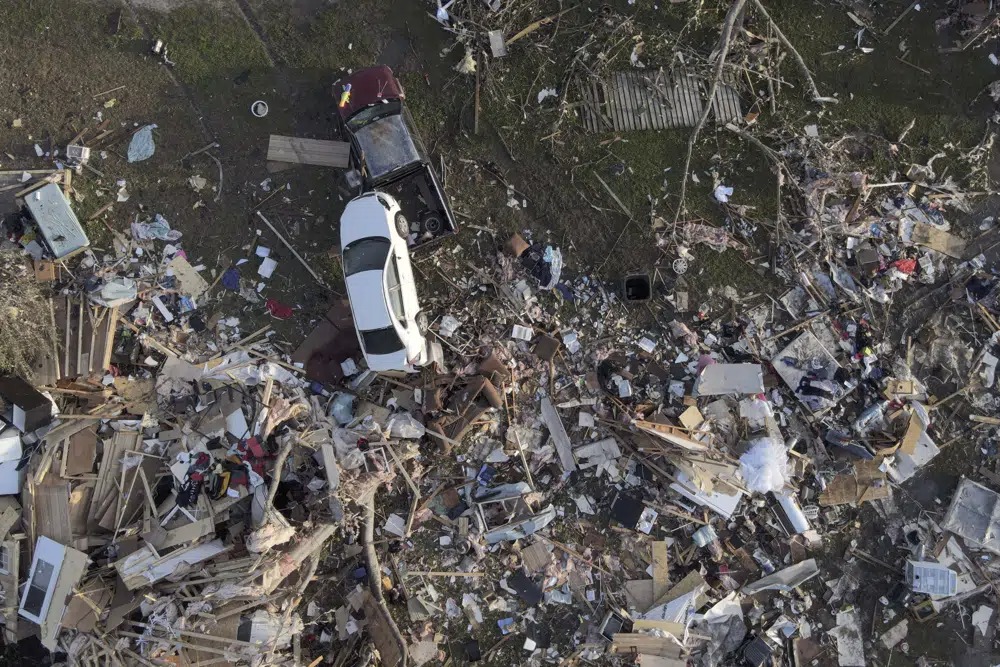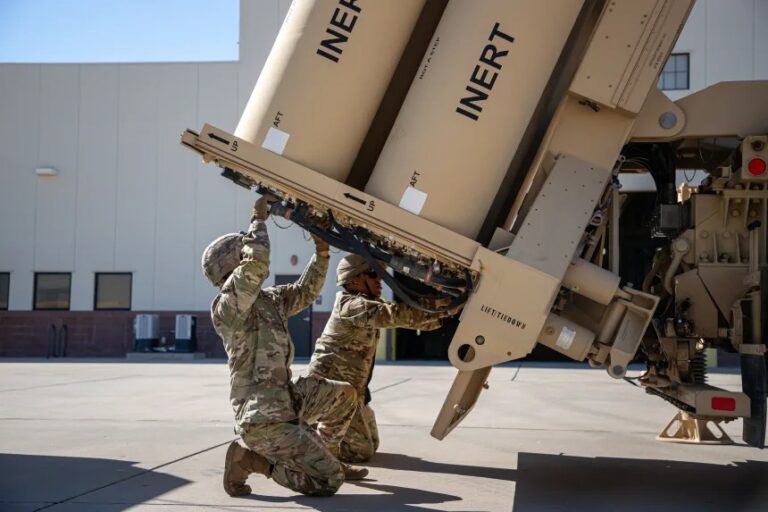Help began pouring into one of the poorest regions of the U.S. after a deadly tornado wrought a path of destruction in the Mississippi Delta, even as furious new storms Sunday struck Georgia, where two tigers briefly escaped their badly damaged safari park.
At least 25 people were killed and dozens of others were injured in Mississippi as the massive storm ripped through several towns on its hour-long, 170-mile path late Friday. A man was also killed in Alabama after his trailer home flipped over several times.
Search and recovery crews resumed the daunting task of digging through flattened and battered homes, commercial buildings and municipal offices after hundreds of people were displaced.
Jarrod Kunze drove to the hard-hit Mississippi town of Rolling Fork from his home in Alabama, ready to volunteer “in whatever capacity I’m needed.”
“The town is devastated,” Kunze said. “Everything I can see is in some state of destruction.”
Kunze was among volunteers working Sunday morning at a staging area, where bottled water and other supplies were being readied for distribution.
“Sharkey County, Mississippi, is one of the poorest counties in the state of Mississippi, but we’re still resilient,” Rolling Fork Mayor Eldridge Walker said. “I feel confident that we’re going to come back and build this community back bigger and better for our families and that’s what we’re hoping and that’s what we’re looking to do.”
“Continue to pray for us,” he added. “We’ve got a long way to go, and we certainly thank everybody for their prayers and for anything they will do or can do for this community.”
President Joe Biden issued an emergency declaration for Mississippi early Sunday, making federal funding available to hardest hit areas.
“Help is on the way,” Mississippi Gov. Tate Reeves told a news conference with local, state and federal leaders.
Deanne Criswell, administrator of the Federal Emergency Management Agency said “we know that this is going to be a long-term recovery event.”
“We can see that one of the major issues we’re going to face is housing,” she said.
The recovery efforts in Mississippi were underway even as the National Weather Service warned of a new risk of more severe weather Sunday — including high winds, large hail and possible tornadoes in Georgia, Louisiana, Mississippi and Alabama.
A tornado reportedly touched down early Sunday in Troup County, Georgia, near the Alabama border, according to the Georgia Mutual Aid Group. Affected areas included the county seat of LaGrange, about 67 miles (108 kilometers) southwest of Atlanta.
“Many buildings damaged, people trapped,” the agency said on Facebook. In nearby West Point, roads, including Interstate Highway 85, were blocked by debris. “If you do not have to get on the roads this morning please do not travel.”
Two tigers “briefly escaped” early Sunday from their enclosures at Wild Animal Safari in Pine Mountain, Georgia, after the park sustained extensive tornado damage, the park said on Facebook. “THE TIGERS ARE SAFE!,” it added. “Both have now been found, tranquilized, and safely returned to a secure enclosure.” None of its employees or animals were hurt, it said.
Following Biden’s declaration, federal funding can be used for recovery efforts in Mississippi’s Carroll, Humphreys, Monroe and Sharkey counties, including temporary housing, home repairs, loans covering uninsured property losses and other individual and business programs, the White House said in a statement.
The twister flattened entire blocks, obliterated houses, ripped a steeple off a church and toppled a municipal water tower.
Based on early data, the tornado received a preliminary EF-4 rating, the National Weather Service office in Jackson said in a tweet. An EF-4 tornado has top wind gusts between 166 mph and 200 mph (265 kph and 320 kph). The Jackson office cautioned it was still gathering information.
In Rolling Fork, a town of 2,000 people, the tornado reduced homes to piles of rubble and flipped cars on their sides. Other parts of the Deep South were digging out from damage caused by other suspected twisters. One man died in Morgan County, Alabama, the sheriff’s department said in a tweet.
The Federal Emergency Management Agency said in a briefing that 25 people were confirmed killed in Mississippi, 55 people were injured and 2,000 homes were damaged or destroyed. High winds, hail and strong storms were expected for parts of Alabama and Georgia on Sunday, the National Weather Service said.
“How anybody survived is unknown by me,” said Rodney Porter, who lives 20 miles (32 kilometers) south of Rolling Fork. When the storm hit, he immediately drove there to assist and found “total devastation.” He said he smelled natural gas and heard people screaming for help in the dark.
“Houses are gone, houses stacked on top of houses with vehicles on top of that,” he said.
Annette Body, who drove to the hard-hit town of Silver City from nearby Belozi, said she was feeling “blessed” that her own home was not destroyed, but other people lost everything.
“Cried last night, cried this morning,” she said, looking at flattened homes. “They said you need to take cover, but it happened so fast a lot of people didn’t even get a chance to take cover.”
Outside of Rolling Fork, a tornado ripped apart the home where Kimberly Berry lived in the Delta Flatlands. The twister left only a foundation and a few belongings — a toppled refrigerator, a dresser and nightstand, a bag of Christmas decorations, some clothing.
Berry said she and her 12-year-old daughter huddled and prayed inside a nearby church as the storm roared outside.
“I didn’t hear nothing but my own self praying and God answering my prayer. I mean, I can get another house, another furniture. But literally saving my life — I’m thankful,” she said.
More than a half-dozen shelters were opened in Mississippi to house the displaced.
Preliminary information based on estimates from storm reports and radar data indicate the tornado was on the ground for more than an hour and traversed at least 170 miles (274 kilometers), said Lance Perrilloux, a meteorologist with the National Weather Service’s Jackson office.
“That’s rare — very, very rare,” he said, attributing the long path to widespread atmospheric instability.
Perrilloux said preliminary findings showed the tornado began its path of destruction just southwest of Rolling Fork before continuing northeast toward the rural communities of Midnight and Silver City and onward toward Tchula, Black Hawk and Winona.
The supercell that produced the deadly twister also appeared to produce tornadoes causing damage in northwest and north-central Alabama, said Brian Squitieri, a severe storms forecaster with the weather service’s Storm Prediction Center in Norman, Oklahoma.
In Georgia, Rachel McMahon awoke Sunday morning to news from her dad that the Troup County motel he’d been staying in was totally destroyed. She said her dad, who is disabled, took shelter in the bathtub when the tornado hit.
He was badly shaken up, but not injured. She had to walk the last half-mile to his motel because of downed trees.
“SO thankful my dad is ok,” she posted on Facebook, along with photos and videos of the damage: houses with gaping holes in roofs, massive tree trunks snapped in half and powerlines dangling every which way.
(AP)











